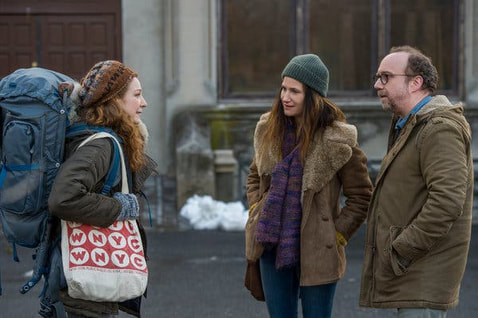B+ | A middle-aged couple tries any means available to them to add a child to their family. Directed by Tamara Jenkins Starring Kathryn Hahn and Paul Giamatti Review by Jon Kissel |

It’s interesting the kind of scenes that Private Life leaves out. Rachel and Richard have no small children in their lives, and therefore the film has no opportunity to show them as parents. Rachel never dotes on a passing toddler, and Richard never pauses to tie a little kid’s shoes. A scene with that kind of gentleness, accompanied by a twinge of wistfulness as the theoretical kid wanders off, practically writes itself, but it’s absent here. In the place where it might happen, with the ignored trick-or-treaters, Rachel and Richard choose to hide in their apartment. Instead, there’s a lot of stuff about the indignities of aging and the regret that goes with it, not only between Rachel and Richard but with Molly Shannon’s sister-in-law Cynthia. Stop worrying about this blood on my face that’s actually a plucked whisker. Stop reminding me that my body is incapable of reproducing and fulfilling its evolutionary imperative. Rachel and Richard don’t seem to want a kid to love as much as they want to renew their declining fortunes and impose structure on their next couple of decades.
Having no experience with long-term relationships, I’ve always imagined them as transitioning from initial physical attraction, which loses potency like any chemical reaction, into a recalibrating of combined goals if the relationship is going to survive. Raising another human being is as good a combined goal as any, and Rachel and Richard are in need of exactly that. Their artistic impulses have reached a level of stasis, such that there’s a sense that they’ve both done as good of work as they’re going to do and the rest will be paying the bills. If they get this new project/baby, all of their fighting and anger over the process will be worth it and they can refocus their relationship. What seems more likely to happen is that the work towards the goal will drive them apart first. Rachel is irritated all the time, ready to erupt at any moment, and Richard is beaten down by having to play peacemaker all the time. While this dynamic plays right into Hahn’s and Giamatti’s wheelhouse, the exhaustion just keeps building up in accretions of set detail and atmosphere. It’s no accident that much of the film takes place in winter, with every spindly, barren tree serving as its own metaphor.
Against Rachel and Richard’s battle with the ravages of age is newcomer Kayli Carter’s Sadie, an unrelated-by-blood niece who thinks of her aunt and uncle as surrogate parents and who agrees to be their surrogate. Aimless and equipped with the better part of a fine arts degree, Sadie’s surface circumstances don’t engender a lot of sympathy, but Carter plays her as cheerfully oblivious most of the time and, on rare occasions, admirably perceptive and reckless in her generosity. In her interactions with Rachel and Richard, we see that the couple would be good mentors to a 20-something, a la the rich couple mentioned in the final scenes with their artist colony, if not good parents of children. The film leans hard towards this revelation, that the central couple doesn’t need a baby as much as they need to help more Sadie’s, but it ends with them still trying to adopt, like all this heartache hasn’t put them off the process whether they go with hormones or agencies. Private Life avoids the pat conclusion even as it sets itself up with one.
Though this is a bleak film with minimal catharsis, Jenkins finds the humor in it. Doctor’s office paper sticking to Giamatti’s butt is inherently funny, as is an angry Hahn strutting around her apartment without pants on like a lewd Donald Duck. Big blowups between characters are leavened by jokes happening concurrently, particularly the uncomfortable Thanksgiving dinner that backgrounds a boring relative droning on and on about his few weeks of sobriety. This isn’t a comedy by any means, but like the best TV dramas repeatedly demonstrated, jokes have to be included no matter how dire the subject matter. Walter White occasionally has to bang his head on a door as he builds a wheelchair bomb. Breaking Bad understood this, and so does Private Life.
Private Life is the kind of domestic drama that overrepresents coastal artists because coastal artists are the ones that make them. I feel like I’m well-acquainted with the lives of New York creatives after dozens of movies about them at various ages and levels of success. If it’s a narrow demographic that the indie-watching viewer just has to surrender to, then at least the characters’ struggles can be honest and perceptive about increasingly common trials. Rachel lashes out against ‘them’ i.e. whoever told her she could have both a career and a family, and Cynthia mentions that Sadie should be freezing her eggs instead of harvesting them. These ramifications of feminism and capitalism are bigger than any single film, and the slice that Private Life is considering implies a level of forethought that someone like Sadie seems incapable of and that Rachel completely took for granted, yet another thing for women to have to worry about while men get to blithely cover the world in jizz, unless, that is, their single testicle is all jammed up. It’s wholly understandable that Rachel’s as irritated as she is, one of many true realizations in Private Life. As I said after reviews of You Were Never Really Here and Leave No Trace in regards to the aforementioned Ramsay and Granik, let’s hope that eleven years don’t have to go by before Jenkins gets another shot behind the camera. B+
 RSS Feed
RSS Feed